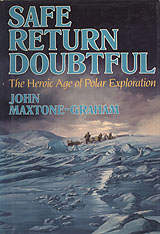
A look back at 19th century heroes
|
This review first appeared in the San Diego Evening Tribune in 1989.
Since Chuck Yeager shattered the sound barrier over the Mojave Desert, there has been a dearth of those we could fairly term heroes in the traditional sense. Not that there are no longer men and women with the courage to face up to the worst nature has to offer and come out best, but we have for the most part conquered the frontiers of our physical world.
To be sure, there are the astronauts, pushing beyond our planet. But the clean-cut crews of NASA seem to pale when compared to the explorers of the past, men who did not have the financial resources of an entire nation behind them, or computers and radios to keep them in constant contact with the best scientific minds of their generation.
In contrast, while the 19th century was, as is our own, a momentous era of scientific accomplishment and exploration, it was also a time when exploration was done not by satellites, but by people, on foot or with draft animals, out of contact with civilization and families. It was a time when expeditions communicated with the rest of the world by leaving a note in a bottle atop a stone cairn and hoping someone would find it.
"Safe Return Doubtful" is a romantic, maybe even romanticized, look back at this time and the men (and women) who pushed beyond the known geographic limits of the arctic regions, culminating with the achievement of both poles shortly before World War I.
John Maxtone-Graham is definitely of the Barbara Tuchman school of history. He breaks no new historical ground, but rather brings to life the expedition leaders who pushed themselves and their men, dogs and ponies through terrible suffering and, in many cases, death, often for ill-defined reasons.
While there have been many histories written on polar exploration, including many first-person accounts, Maxtone-Graham ties together the personal thoughts and experiences of the major expedition participants into a fascinating overview that gives a clear picture of the personal and international impact of these few men's deeds.
It is the narrative of the day-to-day struggle forward, through insufferable cold and hunger, that marks the greatest value of "Safe Return Doubtful." Using diaries and other firsthand sources, Maxtone-Graham attempts to define how these men viewed themselves and their efforts. The author's major issues are not who was first to reach either pole, but rather, at what point did the earlier, non-successful leaders decide to turn back? How did these men deal with adversity and disaster in the harshest climates on Earth? What were the seemingly small details that, when overlooked, could trigger the failure of years' worth of planning and work?
These are the themes, and Maxtone-Graham's exploration is both historically thorough and poetically tributive. For each major exploration, from Sir John Franklin's lost expedition of 1845 through Robert Scott's equally disastrous and final journey of 1911, Maxtone-Graham narrates and critiques the preparations for and history of the polar attempt.
He also gives extensive biographical and personal information on the men who led and manned these expeditions. Themes explored in this area touch on the differing attitudes of the British and Scandinavians toward the handling of sled dogs and on the routines the different expeditions used to wile away the long arctic nights and keep morale up.
Maxtone-Graham also documents the varying types of equipment used by the expeditions,and which outfits were successful (those based on time-tested Eskimo gear) and which were not.
"Safe Return Doubtful" is a strong, comprehensive overview of polar exploration for the reader looking for an authoritative introduction. Maxtone-Graham's writing is clear, his organization concise.
And, while Maxtone-Graham undoubtedly has a fondness for days gone by, he also recognizes that the future will assuredly bring us heroes as grand as those in history: "The ancient polar frontiers have been pushed out into space, an even bleaker wasteland with no north or south, no gale, ice, or snow, but from which safe return can be just as doubtful."

